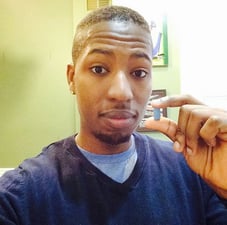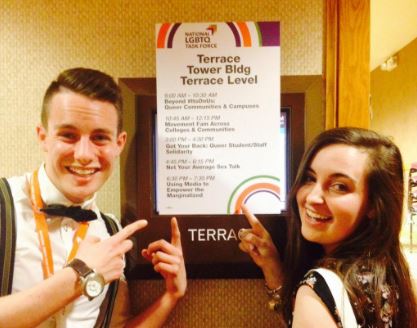Photo Emmett (L) and his co-presenter Lex, at the Creating Change Conference.
“Who feels like their sex ed didn't fully meet their needs?”
Fifty hands immediately flew into the air. Unfortunately, it didn’t surprise me. My co-presenter, Lex Loro, wasn’t surprised either. When we asked this question during our workshop at the National LGBTQ+ Task Force’s Creating Change Conference, we knew the response we would get. We raised our hands ourselves.
I have always considered myself lucky when it came to the sex ed that I was offered. In high school, I was fortunate enough to work closely with our school’s sex educator, Dr. Mary Jo Podgurski, who made it her life mission to provide sex education that enabled young people to make informed choices about their sexual wellbeing. However, operating with limited time, we couldn't cover the depth of sex education that would truly benefit everyone, namely people who are LGBTQ+ like me.
In the sex ed that I received, I learned about my risk factors for contracting HIV, but I never learned that my HIV risk increases because I am a queer trans man. I learned how to prevent pregnancy; I learned how to use a roll-on condom, but I had never heard of an insertive condom until I came to college (you can see a demonstration of insertive condoms here!). Sexual health and wellness goes beyond condom demonstrations. Where is room for conversations about consent? Desexualization? Addressing body differences? Reproductive justice? Even in most comprehensive sex ed programs, the answer is simple: There is no room.
So, we decided to make room. Lex and I started Not Your Average Sex Talk (NYAST) on our college campus out of a desire from queer and trans students to discuss sexual health information that actually pertained to us. NYAST is a peer-to-peer sexual education program taught by college students for college students that uses a social justice framework to discuss issues related to sex and intimacy that are often neglected in traditional sex education settings. NYAST specifically focuses on serving queer and trans people sexual health information that is catered to their specific needs by creating dialogue and resources that are sex-positive, intersectional, and catered towards marginalized people.
Point Foundation recently held a Sexual Health Webinar and Conversation that called for more dialogue about LGBTQ+ sexual health needs. Facilitators, Point scholar Kayla Wingert, and Point Alumni Noël Gordon and Dr. Carl G. Streed, Jr., covered topics ranging from reducing sexual shame and stigma to understanding the divisive debate around PreP. Conversations like these are what sex education should be. There needs to be room for people to ask questions like, “How to I negotiate what my limits are with my partner or partners?” or “Is PreP right for me?”

Point Alum Noel shows off his PreP Daily Blue. Photo courtesy Human Rights Campaign Instagram account.
But at this moment in time, it seems that sex education focuses exclusively on heterosexual people and understanding pregnancy and STI risk management. And while I believe sex education needs to discuss these issues, I don’t believe we should pat ourselves on the back and stop there. There is plenty more work to do to make sex ed inclusive and accessible for those who need it.
So, I’m asking you to challenge your ideas of what sex education could be. Listen to your community. What do people actually need to make better decisions about their sexual health? Community-led sex ed programs that provide equitable access to specific sexual health information are truly what is necessary to improving sexual health for people left out of the conversation. I have always believed that if it is not made for you, make it for yourself. Work across movements. Share your story. Maybe try an insertive condom. But most importantly, find the others.
| This post was written by Wells Fargo Scholar Emmett |
 Emmett told his mother (an ER nurse), and his father (a paramedic), that he would never end up in the health care field as they did. However, after coming out as trans, Emmett experienced barriers to accessing affirming and safe health care services. He realized that the field of health care was exactly where he needed to be. Emmett told his mother (an ER nurse), and his father (a paramedic), that he would never end up in the health care field as they did. However, after coming out as trans, Emmett experienced barriers to accessing affirming and safe health care services. He realized that the field of health care was exactly where he needed to be.
Emmett’s process of identity exploration was not welcomed by his community. Experiencing discrimination, first as a queer woman and then as a queer trans man, Emmett committed himself to advocating and educating his community.
|

